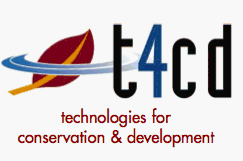Sunday, January 15, 2006
Introduction to Remote Power
How to power and charge an electronic device in the field - for conservationists, perhaps the million dollar question - but conservation and development practitioners are not the only ones challenged by issues of power. Some of the biggest technology companies in the world are investing huge sums in research and development searching for that lucrative breakthrough in power device size and longevity. There are many different approaches, from miniature ethanol-driven 'reactors' through to thin gel-based quick-charging battery packs, all being pursued by big names such as NEC, Toshiba and Hitachi. But as a sign of the challenges that lie ahead, Nokia recently announced that it was dropping its work on methanol-based portable power devices after concluding that the technology was "still some way off maturity".
However, while energy supply is a real issue, it's not the only one - energy efficiency is a key component in the mix, and energy efficient devices with a range of power-saving options can extend the life of a single-charge considerably. Of course, field-based workers still have the options of solar power, portable generators and wind-up chargers, but some of these are not only bulky and impractical in many instances, many are also expensive. With ICT playing an ever-increasing role in global conservation and development work, the problem of powering and charging mobile devices - GSM phones, handheld GPS units, satellite phones, cameras and laptops - becomes all the more acute, and a challenge that more are beginning to face.
What do you think? Please use the comments feature to let us know and help to shape our discussion.
However, while energy supply is a real issue, it's not the only one - energy efficiency is a key component in the mix, and energy efficient devices with a range of power-saving options can extend the life of a single-charge considerably. Of course, field-based workers still have the options of solar power, portable generators and wind-up chargers, but some of these are not only bulky and impractical in many instances, many are also expensive. With ICT playing an ever-increasing role in global conservation and development work, the problem of powering and charging mobile devices - GSM phones, handheld GPS units, satellite phones, cameras and laptops - becomes all the more acute, and a challenge that more are beginning to face.
What do you think? Please use the comments feature to let us know and help to shape our discussion.
Comments:
<< Home
Hi, As part of some work I'm doing for a client, I need to talk to people who are interested in Geocaching and who often search the web for related information. The research is mostly based around keyword ('gps system' for example) selection. I've contacted people using gps system but I need to contact more. Can you suggest where else to look?
TIA
TIA
Hi, As part of some work I'm doing for a client, I need to talk to people who are interested in Geocaching and who often search the web for related information. The research is mostly based around keyword ('gps system' for example) selection. I've contacted people using gps system but I need to contact more. Can you suggest where else to look?
TIA
Post a Comment
TIA
<< Home

